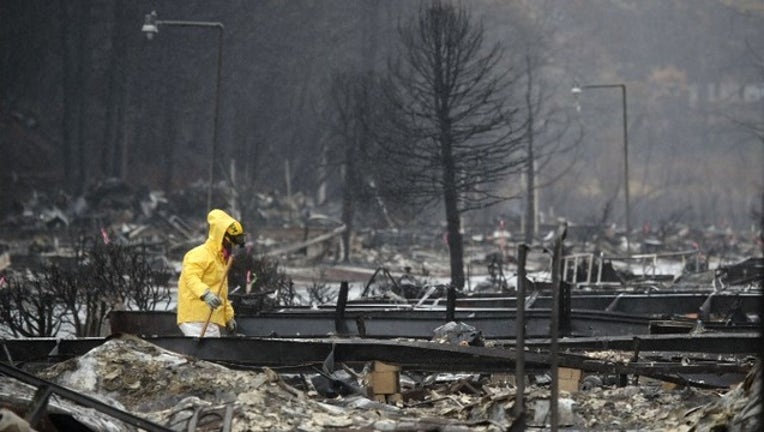Rain hinders search but helps nearly put out Camp Fire

A search and rescue crew member searches for human remains at a mobile home park that was destroyed by the Camp Fire on November 21, 2018 in Paradise, California. (Photo by Justin Sullivan/Getty Images)
Rain is helping to extinguish a deadly wildfire in Northern California's Gold Rush country, but the moisture is also turning ash into thick paste and hindering the hunt for telltale fragments of bone that could indicate a body.
Searchers resumed their grim task Friday afternoon after a downpour eased up in Paradise, California. They fanned out across the ruins of a mobile home park, some combing debris with rakes while others lifted up twisted metal to peer underneath.
Craig Covey, who leads a search team from Southern California's Orange County, said they were searching a mobile home park for seniors for the second time because there are people still missing whose last known address was in this neighborhood.
The searchers, many in yellow rain slickers and hard hats to protect against falling branches, looked for clues that may indicate someone couldn't get out, such as a car in the driveway or a wheelchair ramp. They're looking not only for bone, but anything that could be a pile of cremated ashes.
The nation's deadliest wildfire in the past century has killed at least 84 people, and 475 are still unaccounted for. Despite the inclement weather, more than 800 volunteers searched for remains on Thanksgiving and again Friday, two weeks after flames swept through the Sierra Nevada foothills, authorities said.
Covey's team of about 30 had been working for several hours Friday morning before stopping and returning to a staging area with hot coffee and food under two blue tents. An electric heater provided warmth.
While the rain is making everybody colder and wetter, they're keeping the mission in mind, search volunteer Chris Stevens said, standing under an awning as the team waited out a stretch of heavy rain.
"Everyone here is super committed to helping the folks here," he said.
Two days of rain showers have complicated the search but also helped nearly extinguish the blaze, said Josh Bischof, operations chief for the California Department of Forestry and Fire Protection.
Once the rain clears, state officials will be able to determine if the blaze is fully out, he said.
The Camp Fire ignited Nov. 8 and has destroyed nearly 19,000 buildings, most of them homes. That's more than the worst eight fires in California's history combined, the agency said, with thousands of people displaced.
The volunteers interrupted by rain Friday found other ways to help.
Covey and several team members took two big brown bags full of lunch to 64-year-old Stewart Nugent, who stayed in his home and fought off flames with a garden house, a sprinkler and a shovel. He's been there for two weeks with his cat, Larry.
The first winter storm to hit California has dropped 2 to 4 inches of rain over the burn area since it began Wednesday, said Craig Shoemaker with the National Weather Service in Sacramento.
The weather service issued a warning for possible flash flooding and debris flows from areas scarred by major fires in Northern California, including the areas burned in Paradise.
Shoemaker said the rain there has been steady, and forecasters expect the heaviest showers in the afternoon.
"So far we've been seeing about a quarter-inch of rain falling per hour," he said. "We need to see an inch of rain per hour before it could cause problems."
He said the rain was expected to subside by midnight, followed by light showers Saturday.
In Southern California, more residents were allowed to return to areas that were evacuated because of the 151-square-mile (391-square-kilometer) Woolsey Fire as crews worked to repair power, telephone and gas utilities.
About 1,100 residents were still under evacuation orders in Malibu and unincorporated areas of Los Angeles County, down from 250,000 at the height of the fire.
The fire erupted just west of Los Angeles amid strong winds on Nov. 8 and burned through suburban communities and wilderness parklands to the ocean, leaving vast areas of blackened earth and many homes in ashes. Officials say three people were found dead and 1,643 structures, most of them homes, were destroyed.

